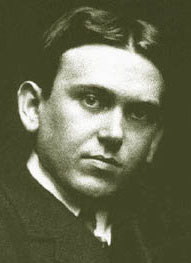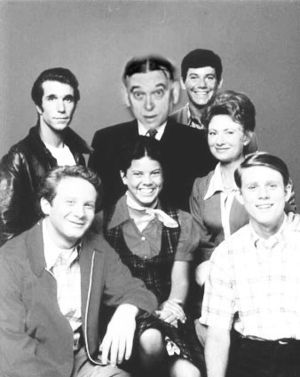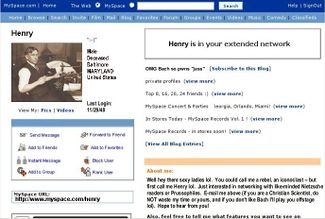H. L. Mencken

Henry Louis "H. L." Mencken (September 12, 1880 – January 29, 1956) was an American author and journalist famous for attacking religious fundamentalism, incompetent politicians and unthinking conformity. Mencken was chiefly responsible for driving all these things out of the United States, after which he devoted himself to The American Language, a study of how English (one of the major languages of England) reached America and turned into Three Stooges routines.
Known as the "Sage of Baltimore," Mencken was controversial during and after his life. The writer argued strongly for evolution and man's descent from apes, which angered monkeys throughout the country. Mencken also held strong prejudices against anything that was not Bach or beer. However, Mencken tirelessly championed free speech and controversial authors, and was formally indicted for crimes against humanity in 1946 for inflicting Theodore Dreiser on the world.
Mencken was a fierce critic of democracy and believed that one's betters (like Mencken) should rule the masses. Even though Mencken has been dead over 50 years, Mencken is better than you. He is often referred to as the "American Nietzsche," although he never sported any stupid facial hair.
Career[edit | edit source]
Mencken was the son of a cigar maker whose father had immigrated from Germany in 1848. As a child, Henry was an avid reader who longed for a career in journalism, and the thrills of muncipal meetings and arguments over property taxes. After weeks of trying, he wrote his first story for the Baltimore Herald in 1899:
Mencken rose quickly. Within two years he was the Herald's drama critic; within three years its managing editor; within four years overmind of the Chesapeake Bay, all while covering zoning boards. During this time, Mencken discovered George Bernard Shaw and Friedrich Nietzsche. Soon, the young reporter wrote:
People used to believe in 'the soul' as they believed in grammar and the grammatical subject: people said that 'I' was a condition and 'think' was a predicate and conditioned — thinking is an activity and a subject must be thought of as its cause. Now, with admirable tenacity and cunning, people are wondering whether they can get out of this net — wondering whether the reverse might be true: that 'think' is the condition and 'I' is conditioned, in which case 'I' would be a synthesis that only gets produced through thought itself.
The article, "Softwaters Subdivision Approved by 2-1 vote," became widely discussed and established Mencken's national reputation. Soon the writer was filing pieces for newspapers and magazines, and writing book reviews he often used as a springboard for philosophical musings.
Mr. Ayres, formerly a member of the staff of the New Republic, has served his time as a professor of philosophy, and, like any other metaphysician in a machine age, is full of vague fevers and shooting pains. In Fluffy Bunny's Tea Party, he endeavors gallantly to reduce them toa series of theses, with supporting syllogisms, but though he enjoys the gift of utterance and is, in fact, extraordinarily articulate for a philosopher, his argument remains, nevertheless, somewhat inchoate.
Mencken became a scourge of America's Puritan traditions, and provided extensive coverage of the Scopes Trial in 1925. Mencken is traditionally credited with calling the proceedings in Dayton, Tennessee the "Monkey Trial," due less to its discussion of evolution and more for the crazed simians who ran in and carried William Jennings Bryan off during closing arguments.

In the years before radio, journalists were the rock stars of their day, drinking what they wanted as a mountain of petticoats piled next to their bedstands. Mencken, the top journalist of his day, lived a life of utter debauchery, drinking beer, meeting three or four women a year for heavy hand-holding and playing Bach well into the night, a pint of lager in one hand and Dorothy Parker in the other.
Mencken fell out of favor during the Great Depression by writing several pieces applauding nationwide starvation, which he hoped would reduce the population of morons. Seeing he was out of favor with the country, Mencken wrote his autobiography, remembering his childhood with Richie, Potsie, Ralph Malph and the Fonz. Published in 1940, Happy Days became a surprise hit, and re-established Mencken's reputation.
The writer spent the rest of his life on his study of American dialects, Fuck All Southerners Everywhere. A cerebral thrombosis in 1948 left him unable to read or write, but Mencken continued to booze, Bach and boink until his death in 1956.
Mencken's ideas[edit | edit source]
Mencken was influenced by Mark Twain, Friedrich Nietzsche and, to a lesser extent, George Bernard Shaw. He believed that a few outstanding individuals did most of the work in improving the health, culture and welfare of society, and felt these natural aristocrats should be given complete freedom to make their marks. Accordingly, Mencken had a broadly libertarian attitude toward government, insisting it should not interfere with these natural processes. He was also skeptical of democracy, saying it tended to put mediocrities in positions of power.
In layman's terms, Mencken thinks you're a moron who deserved to get passed up for that promotion. Are you going to take that? Yeah, that's right, Ted. Kick that Sage's ass!
Mencken's racial attitudes were complex. He expressed bigoted views toward blacks, Jews, Asians, whites, slime people, the dead and the unborn throughout his life, although he befriended many members of these groups while playing "Sleepers Wake" shit-faced.
Quotes[edit | edit source]
| “ | Democracy is the theory that the common people know what they want and deserve to get it good and hard and sideways through their collostomy bag hole. | ” |
| “ | I never lecture, not because I am shy or a bad speaker, but simply because I detest the sort of people who go to lectures and don't want to smell them or their triple major not-admitted lesbian girlfriends." | ” |
| “ | Q: If you find so much that is unworthy of reverence in the United States, then why do you live here?" | ” |
Works[edit | edit source]
- George Bernard Shaw: His Plays (1905)
- I Uncritically Accept Everything Nietzsche Says (1907)
- A Book of Burlesques (1916)
- A Book of Strip-Teases (1917)
- Photos of H.L. Mencken Pole-Dancing (1917)
- In Defense of Women Who Sleep With Me (1917)
- Damn! A Book of Calumny (1918)
- Prejudices: (1919-1927)
- Calvin Coolidge fucks Andrew Mellon up the cock with a jizz-soaked thistle: Another Book of Calumny (1928)
- Schimpflexikon: I Can Write Entire Books On Words That Don't Exist (1928)
- I Really, Really Hate Franklin Roosevelt (1933)
- Seriously, I Want the Bastard Dead (1934)
- Saint Franklin: Or, the Day I Met With the FBI (1936)
- Happy Days: 1880-1892 (1940)
- Hammered Days: 1892-1936 (1941)
- Baywatch Nights (1942)


